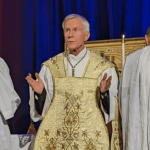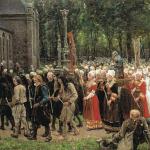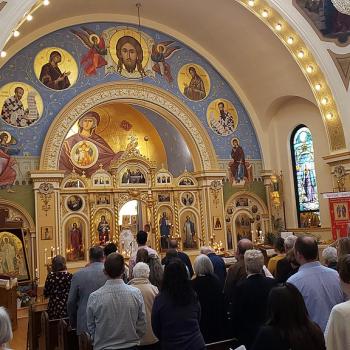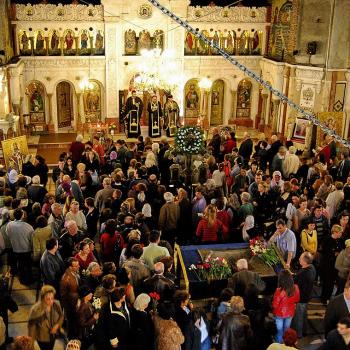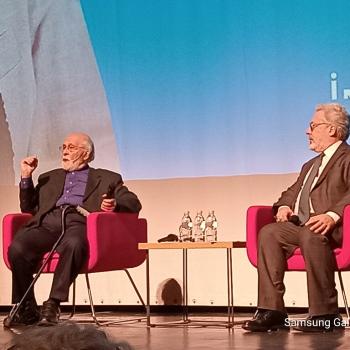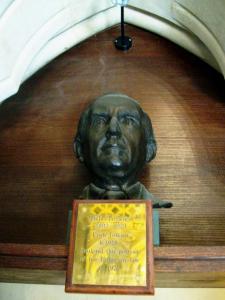
J.R.R. Tolkien’s background such as having a priest, Fr. Morgan, as his guardian after his mother died, as well as his education, with his love for languages and ancient traditions, helped form his personal liturgical preferences. They led him to be disappointed in the various Catholic liturgical developments which occurred after Vatican II, as those changes were not in accord with his own predispositions. However, unlike many who hold similar liturgical inclinations, Tolkien understood the church could and did have the authority to develop its liturgical traditions in ways which ran contrary to his own desires. He knew that he had to humbly accept the way the church was going. This is not to say he found it easy, as he did not, but he knew, as he wrote to another priest, Fr. Alex Jones, his loyalty was being tried: “As you may imagine, I find these days extremely trying: a severe test of loyalty; and attendance at Mass has become an exhausting exercise in patience and humility (in which I am deficient).”[1]
This is a one of the major differences which can be found between Tolkien and many others, who, like him, prefer the Tridentine form of the Western Liturgy. Which is why, if someone were to try to invoke him and his name to support their resistance to the changes which have happened after Vatican II, they would be doing him a grave disservice. He did not reject the authority of the church to develop and change its liturgical tradition. Instead, he said that no matter how difficult it might be for them, they could not just abandon the Catholic faith:
For all of us ‘conservatives’ I think the trouble in our Church is at present more trying than all our personal and physical woes. But it has to be endured. Only loyalty and silence (in public) will provide the ballast for the rocking boat! As the disciples said to Our Lord: we have nowhere else to go….[2]
Tolkien consistently defended the church and its authority and he would be upset to learn that his liturgical preferences were being promoted to turn him into a weapon against the church itself. He believed that his mother’s death came, in part, because she had become Catholic: her family rejected her because of her conversion so that when she found herself all alone, after his father’s death, they did not give her the help she needed. He felt she was a kind of martyr to the faith, and that all the struggles she faced would have been for nothing if he abandoned the faith when he found the situation to be difficult. This is not to say he could not, or would not, complain in private. Similarly, it is clear from his letters, he was struggling with his faith due to the changes which went on after Vatican II. But what he made clear is that those challenges should not serve as excuses for himself to be disloyal to the church, to justify abandoning the church as the church was established by Christ.
Ultimately, Tolkien understood the temporal history of the institutional church was going to be one riddled with problems and to expect otherwise is foolish. On the other hand, he also believed that there would be those who helped advance Christ’s work in the world, and their contributions to the church, more than overcame all the deficiencies he found in the church itself. One good and holy priest, like Fr. Morgan was enough. Similarly, the gifts which Christ gave to the church, that is the sacraments, and especially the eucharist, kept him with the church. He said the only way he could abandon the church in full is if he didn’t believe in Christ and Christ’s teachings, which is not to say he would not be tempted to do so, as he made clear, it is a temptation most if not every Christian faces in their life. “The temptation to ‘unbelief (which really means rejection of Our Lord and His claims) is always there within us.”[3] Or, as he explained in a different letter to his son, Michael, one way he was able to deal with the problems in the church was to understand the church’s primary function was to make such the eucharist was being given out, making it a kind of “monstrance” in history:
We all suffer these strains, since H[oly] M[other] C[hurch] began to employ such vulgar nurses. Still the Church is in the last resort only a tabernacle (or monstrance) for the Blessed Sacrament, and it has been through the ages, each age in a different way, an extremely imperfect one, not to say deplorably ugly and ill-kept. But it is the only one available and outside is the ‘howling-wilderness’. For myself I find that only concentration on the immutable, indelible, and unsulliable sanctity of the Real Presence keeps one in hope and charity. Of course, that at times will make one indignant at the casualness and irreverence of priests (and laity), but that is in Our Lords hands; all we can do is exhibit our own devotion and reverence and teach, if we can, our children to feel and do the same.[4]
Tolkien, moreover, felt the greatest scandals in the church were not blasphemy, such as “liturgical abuses,” but rather, the ways Christians abuse each other (and, of course, non-Christians):
With regard to the blasphemy, one can only recall (when applicable) the words Father, forgive them, for they know not what they do – or say. And somehow I fancy that Our Lord actually is more pained by offences we commit against one another than those we commit against himself, esp. his incarnate person.[5]
This, of course, is a far different position than what is found in those who completely resist Vatican II and its liturgical development. Many of them claim those developments are akin to liturgical abuse, indeed, even “blasphemy” (what, that is, they define as blasphemy, which often is not the case), which they then say justifies their rebellion as such blasphemy must be considered the most important issue at hand. He would find their pretense of piety to be false, as the way they go about it is abusive themselves, showing that what lies behind their revolt is malicious and far from Christian, let alone a representation of traditional Catholicism. For, like St. Thomas More, Tolkien held a strong belief in the teaching concerning the papacy, and the authority of the Pope, which is why it is clear he would have nothing to do with so-called traditionalists who either attack or outright reject the Pope:
I myself am convinced by the Petrine claims, nor looking around the world does there seem much doubt which (if Christianity is true) is the True Church, the temple of the Spirit dying but living, corrupt but holy, self-reforming and rearising. But for me that Church of which the Pope is the acknowledged head on earth has as chief claim that it is the one that has (and still does) ever defended the Blessed Sacrament, and given it most honour, and put it (as Christ plainly intended) in the prime place. ‘Feed my sheep’ was His last charge to St Peter; and since His words are always first to be understood literally, I suppose them to refer primarily to the Bread of Life. It was against this that the W. European revolt (or Reformation) was really launched – ‘the blasphemous fable of the Mass’ – and faith/works a mere red herring. I suppose the greatest reform of our time was that carried out by St Pius X: surpassing anything, however needed, that the Council will achieve. I wonder what state the Church would now be but for it.[6]
But, yet, even though he believed that the institutional church should have the Pope as its authoritative leader, he did not deny the need for Christians of various faith traditions to come together and reestablish the bonds of love they had lost. He worked in and promoted ecumenical gatherings. He believed it was important for Catholics to be a part of them, and indeed, to engage them with all due love and humility, indeed even mutual forgiveness:
I find myself in sympathy with those developments that are strictly ‘ecumenical’, that is concerned with other groups or churches that call themselves (and often truly are) ‘Christian’. We have prayed endlessly for Christian re-union, but it is difficult to see, if one reflects, how that could possibly begin to come about except as it has, with all its inevitable minor absurdities. An increase in ‘charity’ is an enormous gain. As Christians those faithful to the Vicar of Christ must put aside the resentments that as mere humans they feel – e.g. at the ‘cockiness’ of our new friends (esp. C[hurch] of E[ngland]). [7]
No matter how much Tolkien found himself struggling with his faith, something which those who read his letters or other treatments of his life find were very real for him, those struggles did not lead him to justify abandoning the Catholic faith, or reject the authority of the church to determine its liturgical traditions. He felt there was something much more fundamental, much more important, that had to be dealt with, which was the lack of charity among Christians. He believed Christians should respond to the challenges they had with humility instead of aggression. He highlighted the eucharist as being what helped keep him in the faith, that is, he believed in the real presence, and even had some private experience in relation to his eucharistic devotion which helped reinforce it:
The only cure for sagging of fainting faith is Communion. Though always Itself, perfect and complete and inviolate, the Blessed Sacrament does not operate completely and once for all in any of us. Like the act of Faith it must be continuous and grow by exercise. Frequency is of the highest effect. Seven times a week is more nourishing than seven times at intervals. Also I can recommend this as an exercise (alas! only too easy to find opportunity for): make your communion in circumstances that affront your taste.[8]
What Tolkien said at the end of that passage, recommending Michael to receive communion, not where his liturgical sensibilities are met, but rather, to the contrary, where they are challenged, is exactly the kind of message which needs to be told to those so-called traditionalist Catholics who resist the church and its liturgical developments. It is what differentiates Tolkien from them, even if Tolkien shared some aesthetic preferences with them.
[1] J.R.R. Tolkien, The Letters of J.R.R. Tolkien. Revised and Expanded Edition. Ed. Humphrey Carpenter and Christopher Tolkien (Broadway, NY: William Morrow, 2023), 519 [Letter 289d to Father Alex Jones].
[2] J.R.R. Tolkien, The Letters of J.R.R. Tolkien. Revised and Expanded Edition, 531[Letter 294a to Michael Tolkien].
[3] J.R.R. Tolkien, The Letters of J.R.R. Tolkien. Revised and Expanded Edition, 474 [Letter 250 to Michael Tolkien].
[4] J.R.R. Tolkien, The Letters of J.R.R. Tolkien. Revised and Expanded Edition, 366 [Letter 194a to Michael Tolkien].
[5] J.R.R. Tolkien, The Letters of J.R.R. Tolkien. Revised and Expanded Edition, 138 [Letter 86 to Christopher Tolkien].
[6] J.R.R. Tolkien, The Letters of J.R.R. Tolkien. Revised and Expanded Edition, 476 [Letter 250 to Michael Tolkien].
[7] J.R.R. Tolkien, The Letters of J.R.R. Tolkien. Revised and Expanded Edition, 554 [Letter 306 to Michael Tolkien].
[8] J.R.R. Tolkien, The Letters of J.R.R. Tolkien. Revised and Expanded Edition, 475 [Letter 250 to Michael Tolkien].
Stay in touch! Like A Little Bit of Nothing on Facebook.
If you liked what you read, please consider sharing it with your friends and family!
N.B.: While I read comments to moderate them, I rarely respond to them. If I don’t respond to your comment directly, don’t assume I am unthankful for it. I appreciate it. But I want readers to feel free to ask questions, and hopefully, dialogue with each other. I have shared what I wanted to say, though some responses will get a brief reply by me, or, if I find it interesting and something I can engage fully, as the foundation for another post. I have had many posts inspired or improved upon thanks to my readers.


